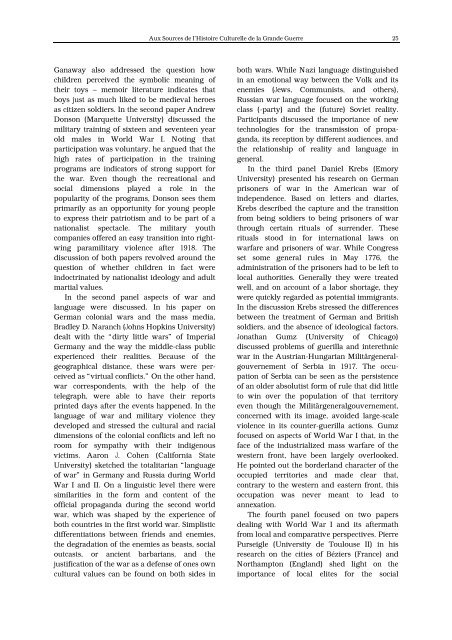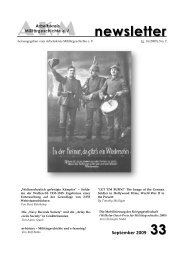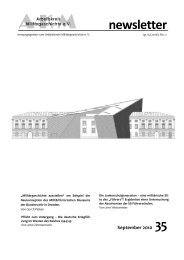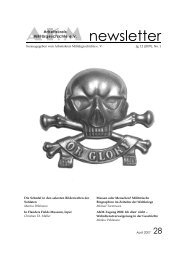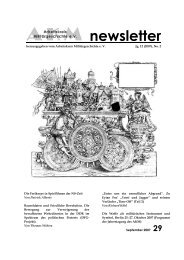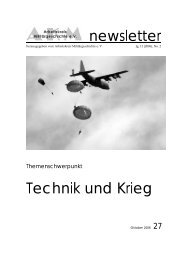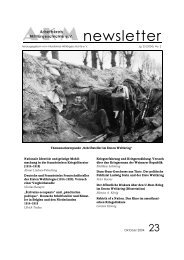Geschichte Erster Weltkrieg - Portal Militärgeschichte - Arbeitskreis ...
Geschichte Erster Weltkrieg - Portal Militärgeschichte - Arbeitskreis ...
Geschichte Erster Weltkrieg - Portal Militärgeschichte - Arbeitskreis ...
Erfolgreiche ePaper selbst erstellen
Machen Sie aus Ihren PDF Publikationen ein blätterbares Flipbook mit unserer einzigartigen Google optimierten e-Paper Software.
Ganaway also addressed the question how<br />
children perceived the symbolic meaning of<br />
their toys – memoir literature indicates that<br />
boys just as much liked to be medieval heroes<br />
as citizen soldiers. In the second paper Andrew<br />
Donson (Marquette University) discussed the<br />
military training of sixteen and seventeen year<br />
old males in World War I. Noting that<br />
participation was voluntary, he argued that the<br />
high rates of participation in the training<br />
programs are indicators of strong support for<br />
the war. Even though the recreational and<br />
social dimensions played a role in the<br />
popularity of the programs, Donson sees them<br />
primarily as an opportunity for young people<br />
to express their patriotism and to be part of a<br />
nationalist spectacle. The military youth<br />
companies offered an easy transition into rightwing<br />
paramilitary violence after 1918. The<br />
discussion of both papers revolved around the<br />
question of whether children in fact were<br />
indoctrinated by nationalist ideology and adult<br />
martial values.<br />
In the second panel aspects of war and<br />
language were discussed. In his paper on<br />
German colonial wars and the mass media,<br />
Bradley D. Naranch (Johns Hopkins University)<br />
dealt with the “dirty little wars” of Imperial<br />
Germany and the way the middle-class public<br />
experienced their realities. Because of the<br />
geographical distance, these wars were perceived<br />
as “virtual conflicts.” On the other hand,<br />
war correspondents, with the help of the<br />
telegraph, were able to have their reports<br />
printed days after the events happened. In the<br />
language of war and military violence they<br />
developed and stressed the cultural and racial<br />
dimensions of the colonial conflicts and left no<br />
room for sympathy with their indigenous<br />
victims. Aaron J. Cohen (California State<br />
University) sketched the totalitarian “language<br />
of war” in Germany and Russia during World<br />
War I and II. On a linguistic level there were<br />
similarities in the form and content of the<br />
official propaganda during the second world<br />
war, which was shaped by the experience of<br />
both countries in the first world war. Simplistic<br />
differentiations between friends and enemies,<br />
the degradation of the enemies as beasts, social<br />
outcasts, or ancient barbarians, and the<br />
justification of the war as a defense of ones own<br />
cultural values can be found on both sides in<br />
Aux Sources de l’Histoire Culturelle de la Grande Guerre 25<br />
both wars. While Nazi language distinguished<br />
in an emotional way between the Volk and its<br />
enemies (Jews, Communists, and others),<br />
Russian war language focused on the working<br />
class (-party) and the (future) Soviet reality.<br />
Participants discussed the importance of new<br />
technologies for the transmission of propaganda,<br />
its reception by different audiences, and<br />
the relationship of reality and language in<br />
general.<br />
In the third panel Daniel Krebs (Emory<br />
University) presented his research on German<br />
prisoners of war in the American war of<br />
independence. Based on letters and diaries,<br />
Krebs described the capture and the transition<br />
from being soldiers to being prisoners of war<br />
through certain rituals of surrender. These<br />
rituals stood in for international laws on<br />
warfare and prisoners of war. While Congress<br />
set some general rules in May 1776, the<br />
administration of the prisoners had to be left to<br />
local authorities. Generally they were treated<br />
well, and on account of a labor shortage, they<br />
were quickly regarded as potential immigrants.<br />
In the discussion Krebs stressed the differences<br />
between the treatment of German and British<br />
soldiers, and the absence of ideological factors.<br />
Jonathan Gumz (University of Chicago)<br />
discussed problems of guerilla and interethnic<br />
war in the Austrian-Hungarian Militärgeneralgouvernement<br />
of Serbia in 1917. The occupation<br />
of Serbia can be seen as the persistence<br />
of an older absolutist form of rule that did little<br />
to win over the population of that territory<br />
even though the Militärgeneralgouvernement,<br />
concerned with its image, avoided large-scale<br />
violence in its counter-guerilla actions. Gumz<br />
focused on aspects of World War I that, in the<br />
face of the industrialized mass warfare of the<br />
western front, have been largely overlooked.<br />
He pointed out the borderland character of the<br />
occupied territories and made clear that,<br />
contrary to the western and eastern front, this<br />
occupation was never meant to lead to<br />
annexation.<br />
The fourth panel focused on two papers<br />
dealing with World War I and its aftermath<br />
from local and comparative perspectives. Pierre<br />
Purseigle (University de Toulouse II) in his<br />
research on the cities of Béziers (France) and<br />
Northampton (England) shed light on the<br />
importance of local elites for the social


